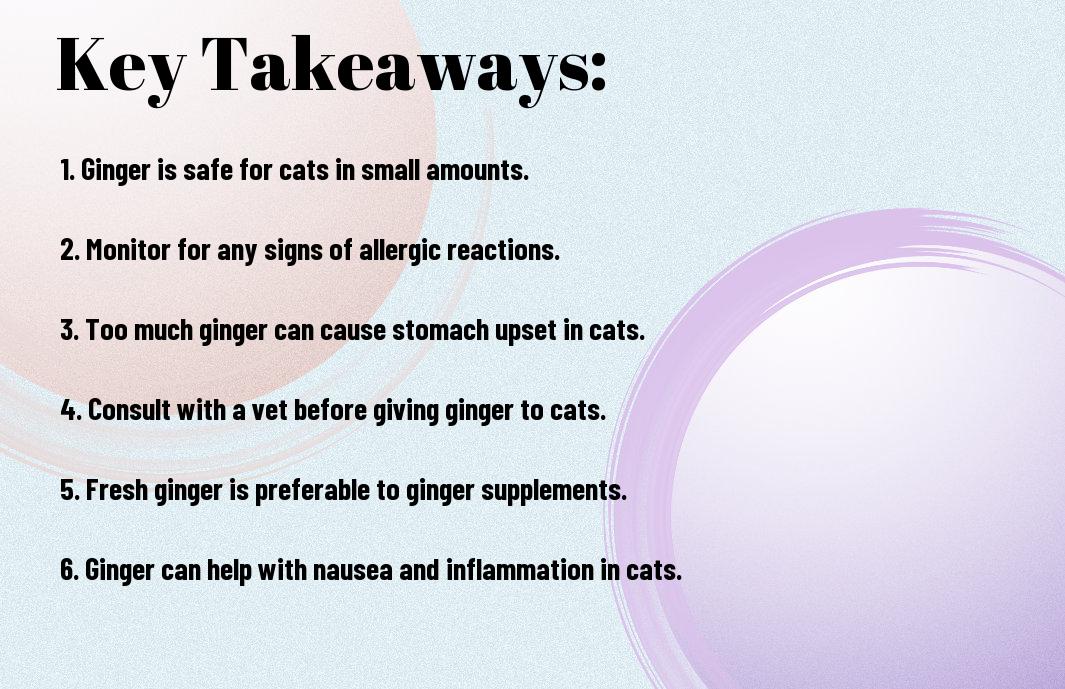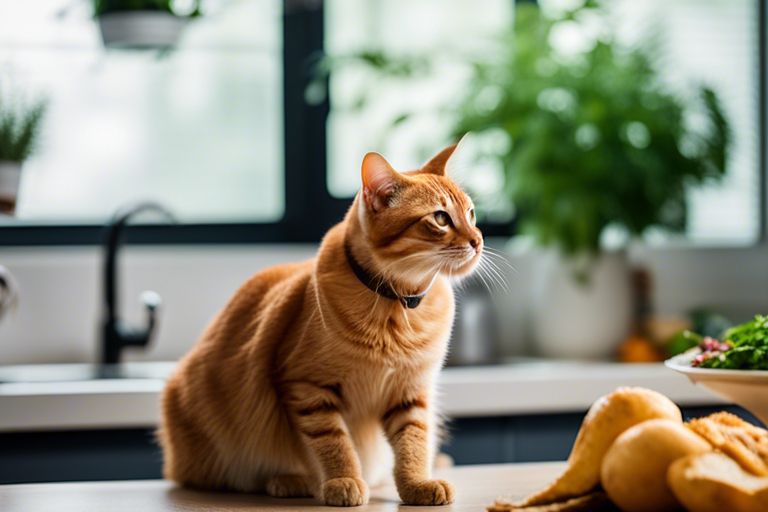Indeed, many pet owners enjoy sharing a variety of human foods with their furry friends, but it’s essential to know which foods are safe for cats and which can be harmful. When it comes to ginger, it is important to consider the potential effects it may have on your feline companions. While ginger offers several health benefits for humans, it can have adverse effects on cats if consumed in large quantities. In this blog post, we will examine the safety of ginger for cats, potential health benefits, and the potential risks associated with feeding ginger to your feline friends.

Understanding Ginger and Its Nutritional Aspects
If you’re a cat owner, you may have wondered whether it’s safe to feed your feline friend ginger. While ginger is known for its many health benefits for humans, it is important to understand how it may affect our pets, specifically our cats. In this chapter, we will delve into the nutritional aspects of ginger and its potential impact on our feline companions.
What is Ginger?
Ginger is a flowering plant that is widely used as a spice and folk medicine. It contains a bioactive compound called gingerol, which is known for its anti-inflammatory and antioxidant properties. In humans, ginger is often used to alleviate nausea, aid digestion, and reduce muscle pain. However, it’s essential to note that cats have a different metabolism than humans, and certain substances that are safe for us may not be safe for them.
Nutritional Properties of Ginger
Ginger is rich in several essential nutrients, including manganese, potassium, and magnesium. It also contains a small amount of dietary fiber and vitamin C. These nutrients are known for their role in supporting overall health and immunity. However, it’s important to be cautious when considering feeding ginger to your cat, as it may have potential adverse effects on their digestive system and overall well-being.
Ginger, when consumed in small amounts, may offer potential benefits for cats, such as supporting digestion and reducing inflammation. However, it’s crucial to consult with a veterinarian before introducing ginger into your cat’s diet to ensure that it is safe and appropriate for your pet’s individual needs.
How to Use Ginger for an Upset Stomach in Cats | Pets
The Safety of Ginger for Cats
Assuming you are considering incorporating ginger into your cat’s diet, it is important to understand the potential safety concerns associated with this spice. While ginger is generally considered safe for human consumption, the same cannot be said for our feline friends. It is crucial to carefully evaluate the safety and potential health benefits of ginger for cats before offering it to your pet.
Potential Health Benefits of Ginger for Cats
Any potential health benefits of ginger for cats are not well-documented. Some sources suggest that ginger may have anti-inflammatory and digestive properties that could benefit cats, especially those with gastrointestinal issues. Additionally, ginger is believed to have antioxidant properties that could potentially support overall feline health. However, it is important to note that there is limited scientific evidence to support these claims, and the effects of ginger on cats have not been thoroughly researched or proven.
Known Risks and Side Effects
Potential risks and side effects of ginger for cats include gastrointestinal upset, allergic reactions, and interactions with certain medications. While some cats may tolerate small amounts of ginger without any issue, others may experience adverse reactions. It is crucial to monitor your cat for any signs of discomfort or adverse reactions after consuming ginger, and to consult with a veterinarian before introducing ginger into your cat’s diet. Additionally, some human foods that contain ginger, such as gingerbread or ginger snaps, may also contain other ingredients that are harmful to cats, such as chocolate or certain spices.
Avoid giving your cat large amounts of ginger, and always introduce new foods slowly and in moderation to minimize the risk of adverse effects. If you notice any unusual symptoms or behavior in your cat after giving them ginger, seek veterinary care immediately.

How to Safely Include Ginger in Your Cat’s Diet
Now that you understand the potential benefits and risks of incorporating ginger into your cat’s diet, it’s important to learn how to do so safely. While ginger can offer certain health benefits for cats, it’s important to use caution and moderation when introducing it into your pet’s diet.
Appropriate Forms of Ginger for Cats
Safely including ginger in your cat’s diet involves choosing the appropriate form of the herb. Ground ginger or fresh ginger root are the safest options for cats, as ginger supplements may contain additional ingredients that could be harmful to your pet. These forms of ginger can easily be incorporated into your cat’s food or treats in small, controlled amounts.
Recommended Dosage and Frequency
Safely introducing ginger into your cat’s diet also means being mindful of the recommended dosage and frequency. It’s important to consult with your veterinarian to determine the appropriate dosage of ginger for your cat based on their individual health needs. In general, a small pinch of ground ginger or a tiny amount of freshly grated ginger root can be given to your cat a few times per week, but it’s crucial to follow your vet’s guidance for the specific needs of your pet.
For instance, if your cat has a sensitive stomach or is on medication, the recommended dosage and frequency of ginger may need to be adjusted accordingly to ensure their safety and well-being.

Wrapping Up
With these considerations in mind, it is important to note that while ginger is generally safe for cats in small amounts, it is advisable to consult with a veterinarian before introducing any new food or supplement into your cat’s diet. While ginger has potential health benefits for cats, including anti-inflammatory and digestive properties, it should be given in moderation and should not replace a balanced diet formulated specifically for feline nutritional needs. It is also important to be aware of any potential allergic reactions or negative interactions with other medications your cat may be on. Ultimately, the safety and well-being of your furry friend should be your top priority, and seeking the advice of a professional is always a wise choice when it comes to your pet’s diet and health.
FAQ
Can cats eat ginger?
Yes, cats can technically eat ginger. However, it is not recommended as it can cause gastrointestinal upset and other complications in cats. It’s best to avoid giving your cat ginger altogether.
Is ginger safe for my cats?
No, ginger is not considered safe for cats. It can cause digestive issues, such as vomiting and diarrhea, as well as potential damage to the red blood cells in cats. It’s important to keep ginger away from your feline friend’s diet.
Are there any benefits to giving ginger to my cats?
There are no proven benefits to giving ginger to cats. In fact, the potential risks far outweigh any perceived benefits. It’s best to stick to a well-balanced diet specifically formulated for cats and consult with a veterinarian before introducing any new foods or supplements into your cat’s diet.

Hello there, I am Iftekhar Ahmed. I am the owner of Mishka & The Cat Corners. I love to explore and write on various topics about cats

